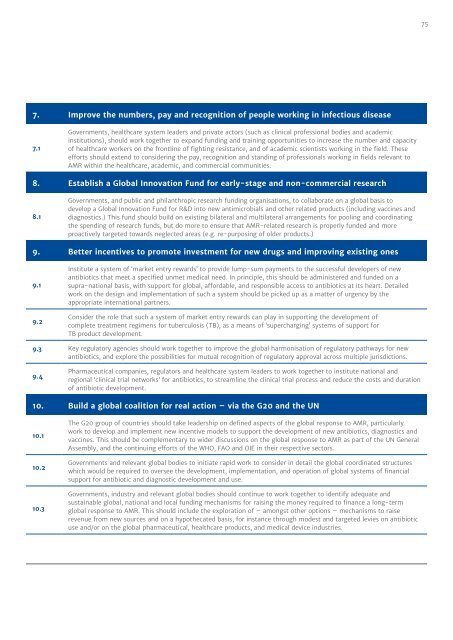TACKLING DRUG-RESISTANT INFECTIONS GLOBALLY FINAL REPORT AND RECOMMENDATIONS
qQvJ300ETXu
qQvJ300ETXu
Create successful ePaper yourself
Turn your PDF publications into a flip-book with our unique Google optimized e-Paper software.
75<br />
7. Improve the numbers, pay and recognition of people working in infectious disease<br />
7.1<br />
Governments, healthcare system leaders and private actors (such as clinical professional bodies and academic<br />
institutions), should work together to expand funding and training opportunities to increase the number and capacity<br />
of healthcare workers on the frontline of fighting resistance, and of academic scientists working in the field. These<br />
efforts should extend to considering the pay, recognition and standing of professionals working in fields relevant to<br />
AMR within the healthcare, academic, and commercial communities.<br />
8. Establish a Global Innovation Fund for early-stage and non-commercial research<br />
8.1<br />
Governments, and public and philanthropic research funding organisations, to collaborate on a global basis to<br />
develop a Global Innovation Fund for R&D into new antimicrobials and other related products (including vaccines and<br />
diagnostics.) This fund should build on existing bilateral and multilateral arrangements for pooling and coordinating<br />
the spending of research funds, but do more to ensure that AMR-related research is properly funded and more<br />
proactively targeted towards neglected areas (e.g. re-purposing of older products.)<br />
9. Better incentives to promote investment for new drugs and improving existing ones<br />
9.1<br />
9.2<br />
Institute a system of ‘market entry rewards’ to provide lump-sum payments to the successful developers of new<br />
antibiotics that meet a specified unmet medical need. In principle, this should be administered and funded on a<br />
supra‐national basis, with support for global, affordable, and responsible access to antibiotics at its heart. Detailed<br />
work on the design and implementation of such a system should be picked up as a matter of urgency by the<br />
appropriate international partners.<br />
Consider the role that such a system of market entry rewards can play in supporting the development of<br />
complete treatment regimens for tuberculosis (TB), as a means of ‘supercharging’ systems of support for<br />
TB product development.<br />
9.3 Key regulatory agencies should work together to improve the global harmonisation of regulatory pathways for new<br />
antibiotics, and explore the possibilities for mutual recognition of regulatory approval across multiple jurisdictions.<br />
9.4<br />
Pharmaceutical companies, regulators and healthcare system leaders to work together to institute national and<br />
regional ‘clinical trial networks’ for antibiotics, to streamline the clinical trial process and reduce the costs and duration<br />
of antibiotic development.<br />
10. Build a global coalition for real action – via the G20 and the UN<br />
10.1<br />
10.2<br />
10.3<br />
The G20 group of countries should take leadership on defined aspects of the global response to AMR, particularly<br />
work to develop and implement new incentive models to support the development of new antibiotics, diagnostics and<br />
vaccines. This should be complementary to wider discussions on the global response to AMR as part of the UN General<br />
Assembly, and the continuing efforts of the WHO, FAO and OIE in their respective sectors.<br />
Governments and relevant global bodies to initiate rapid work to consider in detail the global coordinated structures<br />
which would be required to oversee the development, implementation, and operation of global systems of financial<br />
support for antibiotic and diagnostic development and use.<br />
Governments, industry and relevant global bodies should continue to work together to identify adequate and<br />
sustainable global, national and local funding mechanisms for raising the money required to finance a long-term<br />
global response to AMR. This should include the exploration of – amongst other options – mechanisms to raise<br />
revenue from new sources and on a hypothecated basis, for instance through modest and targeted levies on antibiotic<br />
use and/or on the global pharmaceutical, healthcare products, and medical device industries.


